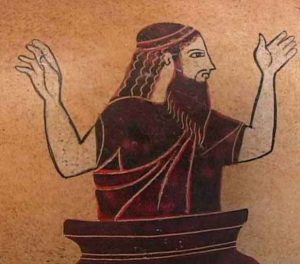Eurystheus Greek Mythology

Of course, Zeus meant the child that his mistress Alcmena would give birth to. But Hera, out of jealousy manifested in her husband’s mistresses and their children, bound him with an oath that any of the Perseides, who would be born first, would be glorified, while the second would be obliged to serve him all his life. Zeus swore and Hera did everything in her power to delay the birth of Alcmena who was in her days and to hasten the birth of Nikippi’s child, who was only seven months old.
When Alcmene began to ache, Moires and Eileithyia settled in front of her room, sat down and tied their arms around their knees, so that by “tying” the pains of interest they would delay the birth of the child; on the contrary, they accelerated them. Nikippi pains. Although the goddesses untied their bound hands earlier, frightened by the passage of a weasel, or, because the daughter of Proetus and friend of Alcmene Galinthiada deceived them with a lie, nevertheless Hera caught up and made Nikippi to give birth first.
And so Eurystheus, who was born first, would rule over the rest, as Zeus had promised to do, and Heracles, who was born four days later, submitted to his service. Eurystheus married Antimachi, daughter of Melanion and granddaughter of Amphidamas. Together they had five sons, Alexander, Ifimedon, Eurybius, Mentoras, and Perimedes and two daughters, Alcyone and Admitus.
Immediately after the death of Heracles, his children were left without a protector and exposed to the hatred of Eurystheus. That is why they took refuge in Trachina, to King Kyukas, who had previously received the exiled and persecuted Heracles, together with his wife and their son Illos; moreover, the hero had helped him to get rid of the pressure of the Dryopes. But Eurystheus pressured Kyukas to expel them.
He, fearing a war with Eurystheus, expelled the descendants of the one with whom he had been bound by acts of mutual benevolence. The Heraclides fled to Athens, where Theseus reigned, and asked for asylum by begging at the altar nof mercy. None of the Athenians, neither the king nor any of the citizens, agreed to surrender them to Eurystheus in violation of the customary law that kept the asylum seekers protected.
When Eurystheus declared war on Athens, the Athenians asked for an oracle and the oracle prophesied that the Athenians would win the war if a virgin of a noble family was sacrificed voluntarily. As soon as the daughter of Heracles and Dianeira Makaria was informed of the oracle, she offered herself for the sacrifice, thus ensuring the victory of the Heraclides and the Athenians against Eurystheus.
Thus, the Heraclides and Athenians, who in all centuries were proud that their city was the only one where the children of Heracles were associated, defeated the army of their enemy, killed his five sons and Yllos the son of Heracles, chased Eurystheus until the Skironides stones, where he killed him, cut off his head and gave it to his grandmother Alcmene; and she with his spindles took out his eyes.
Other traditions want Eurystheus to find death at the hands of Iolaus near Megara, where his tomb was, or that the battle was fought at Marathon, where he was killed, but his body was buried in Gargittos, and his head in Trikorynthos, near the spring that bore the name of the daughter of Heracles Makaria. According to Euripides, Eurystheus was taken prisoner by Iolaodesmos who brought him to Athens to hand him over to Alcminidesmos, which demanded his death despite the urgings of the Athenians not to take such an action. In this version Eurystheus was executed and buried in Pallini of Attica.
